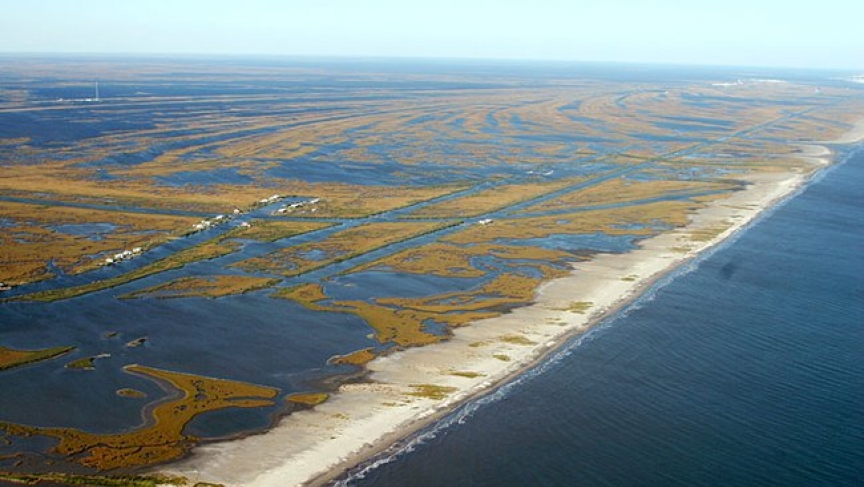NATCHITOCHES – The Louisiana Studies Conference committee has issued a call for papers for the 12th annual conference that will be held Sept. 18-19 at Northwestern State University. The 2020 conference theme, “Losing Louisiana,” is dedicated to exploring the ways in which Louisiana’s cultures, environment, languages and peoples are facing threats to their survival on a variety of fronts.
Presentation proposals on any aspect of this theme, as well as creative texts and performances by, about, and/or for Louisiana and Louisianans, are sought for this year’s conference, said Dr. Shane Rasmussen, director of the Louisiana Folklife Center, which sponsors the conference, along with NSU’s Department of Fine and Graphic Arts and the College of Arts, Sciences, Graduate Studies and Research.
“Although we are especially interested in proposals that deal with the theme of ‘Losing Louisiana,’ all papers, creative writing and short performances (dance, music, or theatrical) that address any aspect of Louisiana studies are welcome,” Rasmussen said.
Proposals are being solicited for 15-minute presentations from scholars at all career stages as well as graduate students. Creative work (film, creative non-fiction, short fiction and poetry) is welcome. Undergraduates are invited to submit, provided they are working with the guidance of a trained scholar. All undergraduate presenters under 18 years of age must be accompanied to the conference by a parent or legal guardian.
Conference registration is free for all faculty, staff and students affiliated with Bossier Parish Community College, the Louisiana Scholars’ College, the Louisiana School for Math, Science and the Arts, the National Center for Preservation Technology and Training and Northwestern State University, as well as State and National Park Service personnel situated in Natchitoches Parish.
Abstracts of 300 words maximum for scholarly proposals, creative writing, films and short performances (dance, music, or theatric) should be sent as e-mail attachments to Rasmussen at rasmussens@nsula.edu. Presentations should run no longer than 15 minutes. Proposals should briefly detail the audio/visual tools (laptop, projection screen, data projector, DVD player, etc.) or space your presentation will require, if any. The stage in Magale Recital Hall will be provided for short performances.
Proposals should include a separate cover page with name, affiliation, mailing and e-mail address and the title of the presentation. E-mails should be entitled Louisiana Studies Conference Submission. The committee will send an e-mail acknowledgement receipt of each abstract within one week. If no acknowledgment is received, submissions should be resent.
The deadline for submissions is June 1. Accepted presenters will be notified via e-mail by June 15, if not before.
This interdisciplinary conference will be accepting proposals from the following disciplines: American studies, anthropology, architecture, archival studies, communications, craft, creative writing, criminal justice, cultural studies, cultural tourism, dance, design, education, English and literary studies, environmental studies, ethnic studies, fashion design, film studies, fine arts, folklore, gender studies, geography, heritage resources, history, interior design, journalism, linguistics, media studies, museum studies, musicology, music performance, philosophy, photography, political science, preservation studies, psychology, queer studies, religious studies, Romance languages, social work, sociology, theatre and vernacular architecture.
Read broadly, proposals should consider the following possibilities for presentation topics relating to the theme “Losing Louisiana.”
“Louisiana, its cultures, history, literature, peoples, places, etc. should be an intrinsic aspect of the proposed presentation,” Rasmussen said. “For example, ‘thematic motifs in Southern literature’ in itself would not be an appropriate presentation topic proposal for the Louisiana Studies Conference, while ‘thematic motifs in 21st century Louisiana short fiction’ or ‘thematic motifs in the contemporary legends of Evangeline Parish’ would both be appropriate.”
The following list of suggestions is not meant to be comprehensive.
- Archaeology
- Architecture (including Vernacular Architecture)
- Archives
- Borders
- The Brain Drain Crisis
- Built Environments
- Cemeteries and Graveyards
- Climate Change
- Coastal Erosion
- Conservation
- Crafts
- Cultural Drift
- Dancehalls
- Disruptions
- Documentation
- Economies (including cultural economies)
- Ethnicities
- Foodways and Folkways – Past, Present, Evolving
- Frontiers (cultural, geographic, musical, mythic, narrative, etc.)
- Historical Landmarks and Sites
- Language Loss
- Legacies
- Literatures
- Louisianan Identities
- Main Streets
- Monuments
- Murals
- Native American Spaces
- The Neutral Strip
- Preservation
- Raising Consciousness
- Religion and Spirituality
- Solutions
- State and National Parks
- Traditions
- Unsustainability
A selection of scholarly and creative work presented at the conference will be solicited for publication in the Louisiana Folklife Journal, a peer reviewed academic journal produced by the Louisiana Folklife Center. Additional information is available on the website for the Louisiana Folklife Center: https://louisianafolklife.nsula.edu/.
Conference co-chairs assisting Rasmussen are Dr. Lisa Abney, faculty facilitator for academic research and community college outreach and professor of English at Northwestern State University; Jason Church, materials conservator, National Center for Preservation Technology and Training; Dr. Charles Pellegrin, professor of history and director of the Southern Studies Institute at Northwestern, and Sharon Wolff, CA, assistant archivist at the Cammie G. Henry Research Center.


